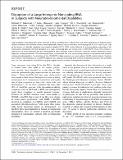Disruption of a Large Intergenic Noncoding RNA in Subjects with Neurodevelopmental Disabilities
Author(s)
Kellis, Manolis; Lin, Michael F.
DownloadTalkowski-2012-Disruption of a Larg.pdf (617.0Kb)
PUBLISHER_POLICY
Publisher Policy
Article is made available in accordance with the publisher's policy and may be subject to US copyright law. Please refer to the publisher's site for terms of use.
Terms of use
Metadata
Show full item recordAbstract
Large intergenic noncoding (linc) RNAs represent a newly described class of ribonucleic acid whose importance in human disease remains undefined. We identified a severely developmentally delayed 16-year-old female with karyotype 46,XX,t(2;11)(p25.1;p15.1)dn in the absence of clinically significant copy number variants (CNVs). DNA capture followed by next-generation sequencing of the translocation breakpoints revealed disruption of a single noncoding gene on chromosome 2, LINC00299, whose RNA product is expressed in all tissues measured, but most abundantly in brain. Among a series of additional, unrelated subjects referred for clinical diagnostic testing who showed CNV affecting this locus, we identified four with exon-crossing deletions in association with neurodevelopmental abnormalities. No disruption of the LINC00299 coding sequence was seen in almost 14,000 control subjects. Together, these subjects with disruption of LINC00299 implicate this particular noncoding RNA in brain development and raise the possibility that, as a class, abnormalities of lincRNAs may play a significant role in human developmental disorders.
Date issued
2012-12Department
Massachusetts Institute of Technology. Computer Science and Artificial Intelligence Laboratory; Massachusetts Institute of Technology. Department of Electrical Engineering and Computer ScienceJournal
The American Journal of Human Genetics
Publisher
Elsevier
Citation
Talkowski, Michael E., Gilles Maussion, Liam Crapper, Jill A. Rosenfeld, Ian Blumenthal, Carrie Hanscom, Colby Chiang, et al. “Disruption of a Large Intergenic Noncoding RNA in Subjects with Neurodevelopmental Disabilities.” The American Journal of Human Genetics 91, no. 6 (December 2012): 1128–1134. © 2012 The American Society of Human Genetics
Version: Final published version
ISSN
00029297
1537-6605